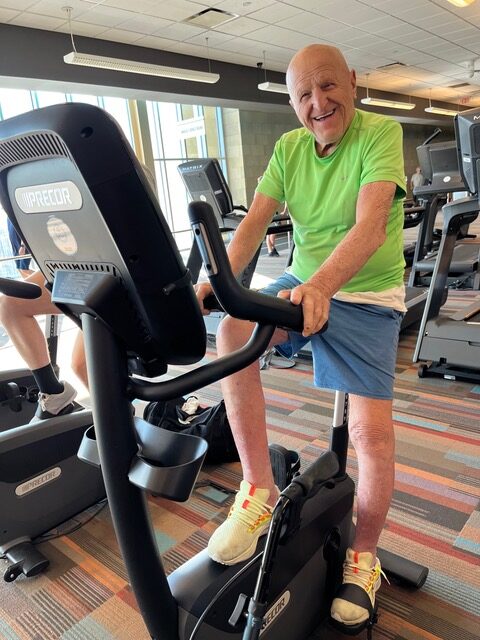Eighty years after enlisting to fight in World War II, Ralph Hall is still on the move. Well, in a manner of speaking. He goes bicycling just about every day, but these days he rides a stationary bike at the Downtown YMCA.
His motivation? “Stay strong and healthy,” Hall, 97, said.
For those who regularly spot him at the Y, Hall’s dedication to exercise is inspiring. For those who get to know him better, his tales of nearly a century of living are a reminder of life’s twists and turns.
Hall was born and raised in Attleboro, Mass., once known as “The Jewelry Capital of the World.” There wasn’t much money around during the Great Depression but his dad was creative, painting a dairy’s barn in exchange for milk and taking his seven kids skating when the low-lying swamps around Attleboro froze over. Hall’s mother, who’d been born in Newfoundland, worked in a laundry.
At 16, Hall dropped out of school to operate a kick press in one of the town’s jewelry manufacturers (soon converted to producing gun parts and Purple Hearts). The next year, he was accepted into the U.S. Navy, following two brothers and two brothers-in-law who’d already joined the military.
He went through bootcamp in Newport, R.I., then attended gunnery school and was sent to Solomons Island, Md., for amphibious training. A sister, Audrey, “would knit and send me socks,” he said. She was also one of the pin-up girls whose photographs were sent to soldiers.
Hall was assigned to a new gunboat out of Norfolk along with 40 other soldiers, cooks and a pharmacist serving as ship’s doctor. Seaman Second Class Hall’s job was to clean and paint the ship — a “swabbie,” as another Y regular, John Todd, calls him.
Part of a flotilla of 18 ships, the boat made it to Key West, through the Panama Canal, to San Diego and then Pearl Harbor. Hall’s ship was headed to Palau, an island country in the western Pacific that the United States had recaptured from the Japanese, for patrol duty. But the boat was delayed resupplying, then ran aground and partially sank in bad weather.
Picked up by a destroyer, the crew spent a couple months living in tents at Pearl Harbor. Eventually, Hall’s boat returned to duty and the crew made it to Palau for patrol duty. Japanese kamikazee pilots tried to dive bomb the ships. Hall was on Palau when the United States dropped atomic bombs on Japan, effectively ending the war. Some Japanese surrendered to the sailors on Palau. Hall returned to San Diego via the Philippines. The boat’s guns were removed and sent to the scrapyard.
Hall was honorably discharged in April 1946. He’d corresponded with a girlfriend, but they broke up when he returned from the war.
Hall went back to high school and worked afternoons helping a butcher. He wanted to become a hydraulic engineer, but the folks at Boston College quickly dissuaded him, pointing out that an eye condition meant he couldn’t draw a straight line. So he worked and studied part-time at a cooperative school, Boston Northeastern University, for several years before a brother living in Denver persuaded him to come west. He got accepted at Western State College in Gunnison, Colo.
In the summer of 1952, he was working as a diamond driller in Leadville, Colo., when he spotted a pretty girl at the town’s annual burro races. Dolores Bare worked on the presses at her father’s newspaper in Leadville and was also a nursing student. Hall went to the newspaper office a few days later to ask her out. They dated, married and had two children — Mary and Ralph, Jr. Hall took a job as a sales rep covering part of western Colorado, worked for John Hancock Insurance in Denver and then was transferred to San Francisco.
About 1962, suffering from breathing problems, Hall saw a doctor who advised him to lose weight. He joined a YMCA and has been exercising ever since.
Ralph and Dolores Hall divorced and went their separate ways in 1974. She moved to Wichita and married Don Granger, an editor at the Wichita Eagle.
After a couple more job changes, Ralph eventually landed a job with AT&T that kept him in Alabama for 30 years. He continued going to the Y and got his small plane pilot’s license.
About 10 years ago, Hall’s daughter, Mary, called him and “told me I was no longer going to live alone.” Hall called Dolores to ask about possible residential rentals in the Wichita area. Dolores, whose husband had died, invited him to share her home. They continue to live together.
From Model Ts to Teslas and kick presses to computers, Hall has seen his share of history but still greets each day with enthusiasm.
Hall got COVID in 2020, then broke his hip in June 2022. But he returned to exercising as soon as he could. The after effects of COVID have made it difficult for him to swim, although he still occasionally takes part in water aerobics classes at the Y.
He rides a stationary bike for an hour seven days a week, trying to maintain the same speed as when he biked in his neighborhood. Because many other older Y members are also recovering from a disease or illness, or returning to a fitness routine afer a hiatus, the sight of Hall using a walker to reach his stationary bike can’t help but inspire them.
Melanie Jenney is a water group exercise instructor at the Robert D. Love Downtown YMCA. She first met Ralph Hall, then 92, when he performed a cannonball to enter the pool one of her classes. She can be reached at mjenney@gmail.com.









